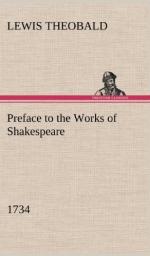[Sidenote*: Causes of Obscurities in Shakespeare.]
Again, as some Notes have been necessary to point out the Detection of the corrupted Text, and establish the Reiteration of the genuine Readings; some others have been as necessary for the Explanation of Passages obscure and difficult. To understand the Necessity and Use of this Part of my Task, some Particulars of my Author’s Character are previously to be explain’d. There are _Obscurities_ in him, which are common to him with all Poets of the same Species; there are Others, the Issue of the Times he liv’d in; and there are Others, again, peculiar to himself. The Nature of Comic Poetry being entirely satyrical, it busies itself more in exposing what we call Caprice and Humour, than Vices cognizable to the Laws. The _English_, from the Happiness of a free Constitution, and a Turn of Mind peculiarly speculative and inquisitive, are observ’d to produce more _Humourists_ and a greater Variety of Original _Characters_, than any other People whatsoever: And These owing their immediate Birth to the peculiar Genius of each Age, an infinite Number of Things alluded to, glanced at, and expos’d, must needs become obscure, as the _Characters_ themselves are antiquated, and disused. An Editor therefore should be well vers’d in the History and Manners of his Author’s Age, if he aims at doing him a Service in this Respect.
Besides, Wit lying mostly in the Assemblage of Ideas, and in the putting Those together with Quickness and Variety, wherein can be found any Resemblance, or Congruity, to make up pleasant Pictures, and agreeable Visions in the Fancy; the Writer, who aims at Wit, must of course range far and wide for Materials. Now, the Age, in which Shakespeare liv’d, having, above all others, a wonderful Affection to appear Learned, They declined vulgar Images, such as are immediately fetch’d from Nature, and rang’d thro’ the Circle of the Sciences to fetch their Ideas from thence. But as the Resemblances of such Ideas to the Subject must necessarily lie very much out of the common Way, and every piece of Wit appear a Riddle to the Vulgar; This, that should have taught them the forced, quaint, unnatural Tract they were in, (and induce them to follow a more natural One,) was the very Thing that kept them attach’d to it. The ostentatious Affectation of abstruse Learning, peculiar to that Time, the Love that Men naturally have to every Thing that looks like Mystery, fixed them down to this Habit of Obscurity. Thus became the Poetry of DONNE (tho’ the wittiest Man of that Age,) nothing but a continued Heap of Riddles. And our Shakespeare, with all his easy Nature about him, for want of the Knowledge of the true Rules of Art, falls frequently into this vicious Manner.




